There was once a group of sharp young teens looking for some fun. But all the games they toiled to purchase had a plethora of plot holes and problems. They joined forces and gave themselves one mission: to make the best game in the history of games! They called themselves Mighty Box… and this is their story. Words by Cassi Camilleri.
Marvin Zammit, Mark Casha, Fabrizio Calì, Prof. Gordon Calleja, and Thom Cuschieri—these are the men behind the Kickstarter success story that is Mighty Box. What began as a humble startup’s attempt to raise $25,000 and print 1,000 copies of a little post-apoc game called Posthuman ended up snowballing into a nationwide phenomenon that travelled well beyond home shores. The project has amassed a whopping pot of around $350,000, resulting in over 8,000 copies sold (and counting).
Now, Mighty Box is reaping the rewards of virality, with a captive audience eagerly awaiting their next release. The challenges that stemmed from the hype around Posthuman have become lessons learnt. But let’s not rush ahead. Let’s start from the beginning.
Your friendly neighbourhood game geeks
The title of ‘game designer’ comes with a series of stereotypes attached. They are the guys who continue to play Dungeons & Dragons way beyond the intended age bracket. These are the guys who laugh in the face of ‘reasonable’ gaming hours per week; the guys who post those extravagant game conference hauls on Instagram. It’s a stereotype. But it exists for a reason. And the Mighty Box guys tick a fair number of those boxes.
‘We’ve been into board games since we were young,’ says Zammit with a smile, ‘We had a board game club: The Guild. It’s where Mark, Gordon, and I met over twenty years ago’. Rift, Cyberpunk 2020, anything with the Generic Universal RolePlaying system, they played them all to tatters. Natural progression would see them build their own systems ‘to make up for shortcomings in the games [they] bought,’ adds Casha.
On Will love tear us apart?: ‘Some hard core fans were upset about it. Some called it ‘the most depressing game ever’. Considering the subject matter though, we took it as a compliment.’ Mark Casha
The kindling of what was to come were clearly glowing early on. But the road to Mighty Box was long and winding.
Following their respective times at the University of Malta (UoM) the three took very different paths. Zammit’s physics background led him to Methode, where he led an engineering team. Casha went on to become a lecturer in Visual Arts at the Faculty for Built Environment (UoM). Meanwhile, Calleja left Malta to pursue further study, reading for a PhD in Games Design at the University of Copenhagen. It was with Calleja’s return to Malta and a very interesting proposal, that those fateful embers sparked and things took a turn.
Solid foundations
Calleja returned from Denmark as a professor and founder of the Institute of Digital Games, full of ideas. The old team came together again with the aim of making a game. Brainstorming ensued.
‘We came up with a lot of ideas, but we couldn’t agree on anyone,’ reveals Casha, ‘We were trying to find a project to use as a testing ground, to see if we could work together. We didn’t want to go for something too serious. Then a friend of ours applied for the Malta Arts Fund.’ That friend was Steffi deGiorgio and the project was Will love tear us apart?
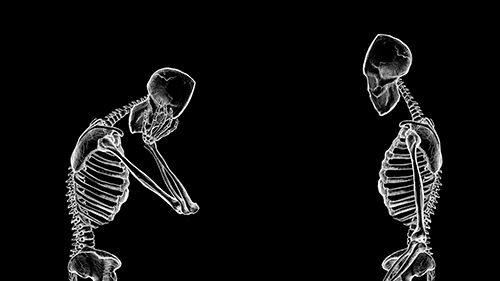
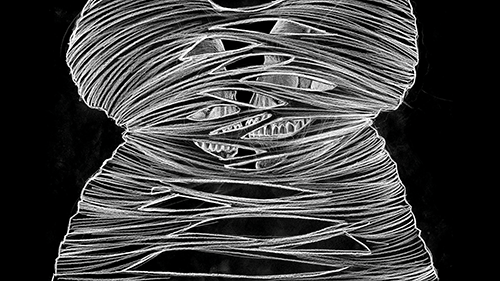

Will love tear us apart? was Calleja’s brainchild. His idea was to adapt the legendary Joy Division track into a game that would elicit the same feelings. Casha brought in Calì as illustrator and 3D modeller, and Cuschieri as composer and sound designer. What they ended up with was a haunting art piece about love and the devastating loss it can leave behind when it ends.
‘The press snapped it up,’ notes Casha. ‘PC Gamer, Rolling Stone, even Joy Division endorsed the game. They shared it on their page.’ The best compliments they received were from players describing it as ‘the most depressing gaming experience ever.’ Of course, there were naysayers, admits Zammit, but that was to be expected. ‘Some hardcore fans were upset about it, telling us that the song was sacred and shouldn’t be touched.’
A couple of award nominations later, and the
team was meeting labels to create the next game inspired by music. This is where Mighty Box truly began. ‘We were still working on separate jobs at the time so we met at weekends, eating expired food, and hashing things out,’ Zammit recalls, laughing. ‘We were trying to find our feet at that stage. We spent a full six months sending out proposals, trying to get a foot in the industry. But it soon became clear that it wasn’t going to work. Projects kept dropping and we were just burning money coming up with ideas for other people.’ They needed to focus on themselves and what they wanted to do.
Granarchy was the next project they sank their teeth into. A mobile platformer, the player is in control of a granny chasing kids across roofs, avoiding all sorts of BBQ paraphernalia Maltese people tend to keep on their roofs. They used this game as a platform for more funding; cue Invex and Malta Enterprise. It was at this point that Mighty Box got its first two full-timers. Zammit and Calì quit their previous jobs in a do-or-die moment. Unfortunately, Granarchy was never to see the light of day. The team pushed on, trying with all their might to tie up the project but it wasn’t quite working. ‘We stopped because it wasn’t the thing we wanted to do,’ says Casha. What they wanted to do was Posthuman.
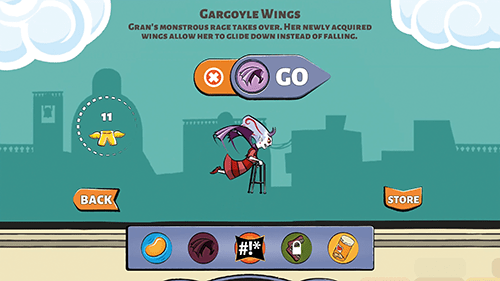
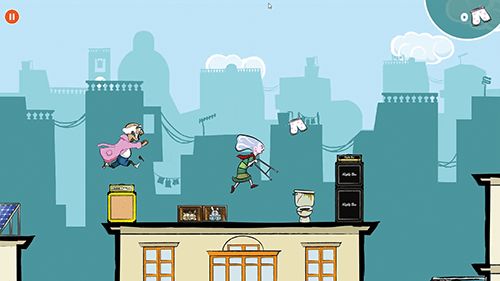
The big boy
Posthuman was originally conceptualised as a digital game. The idea was more akin to Posthuman: Sanctuary. But the team’s attempts to fund the game were fraught with scepticism. It was considered ‘too ambitious to produce in a year (the time span afforded for project development),’ recalls Zammit. ‘In hindsight, they were probably right,’ admits Casha.
The team took the rejection of their digital game and embraced it. They took a step back and squeezed out what they could for the next step forward—the Posthuman board game.
At that point, artwork for the digital game was already being produced, so it was also a case of keeping the same team and reusing resources. ‘We also thought [a board game] could be a marketing stunt that could bring people in on the Posthuman world’ and allow them to make the digital game later. With that decision, they acquired the Malta Digital Games Fund, and everything began falling into place.
Work progressed well, and Posthuman started coming together. However, more money was needed to find the right market. Kickstarter and the US beckoned. But for this, an American account had to be acquired.
We started building our own systems ‘to make up for shortcomings in the
games we bought.
Partnering with Mr B Games allowed Mighty Box to launch Posthuman on Kickstarter, a move that would see the game gaining major traction among board game fans the world over. Mr B ended up managing the Kickstarter campaign with the team and took over the responsibility of shipping and handling the game.
In December 2015 Posthuman started its journey to people’s homes, and the rest was history!
Issues
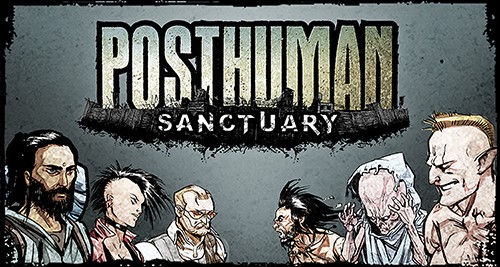 ‘Posthuman was not a perfect game’, Zammit candidly notes. Development was mired with artist issues and having to find new people to replace others, slowing things down significantly. However, the team also admits that there are plenty of things they would have done differently in hindsight.
‘Posthuman was not a perfect game’, Zammit candidly notes. Development was mired with artist issues and having to find new people to replace others, slowing things down significantly. However, the team also admits that there are plenty of things they would have done differently in hindsight.
Casha calls out the high ratio of text in the game right off the bat as a mistake that they will not be repeating. The time it took to proof all the text and ensure that they had all the terminology correct was unprecedented. The size of the box was also an issue. ‘The box was too small for shops,’ says Zammit. ‘People will pay more for a bigger box. There’s a certain size that goes with a price range,’ he explains, ‘but having a bigger box also meant that the shipping would be more expensive. And we didn’t want to do that.’
Most surprisingly, the game’s viral status was also a problem. ‘We were reacting to the kickstarter day by day. People were burning through the stretch goals like crazy, and we needed to create more all the time,’ says Casha. ‘We should have charged more for the expansion. But those were all knee jerk reactions,’ he continues.
There are no hard feelings, of course. Posthuman has given Mighty Box a solid foundation upon which to build. But lessons have indeed been learnt, and the team has kept them all up their sleeves for when they need them.
The road ahead
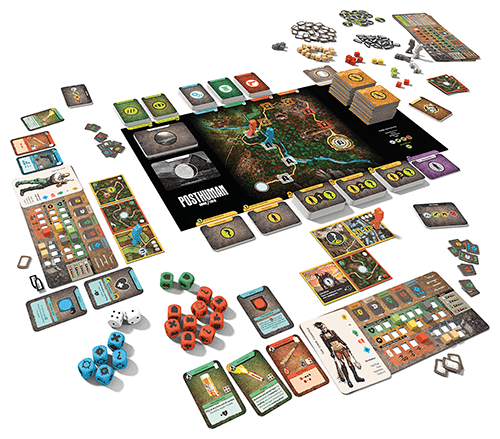
The journey towards Mighty Box may have been long and winding, but with all the experience under their belts, things have never been better. The team’s next project, Vengeance, another board game designed by Calleja, was shown huge support on its own Kickstarter campaign and will begin making its way into homes in July of this year. But that is not the only project they have in the works. The 2D puzzle platformer Just Another Recon Mission has just started development, thanks to support from Arts Council Malta. This game comes with a twist thanks to an added dimension and a level editor that players can use to create their own levels and share them with other players.
There is no doubt that this team is going for the long haul. With that future in mind, they look forward to changes being made in the local games industry: further legislation is needed to regularise the industry. ‘We need to set up structures that allow local companies to grow,’ Zammit notes. At the moment, current regulations such as tax breaks favour foreign companies, Casha adds. ‘What we want is to benefit from the same benefits,’ he says.
Zammit finishes things off with a little piece of advice, ‘know what you want to achieve.’ Casha smiles knowingly, then adds, ‘and stick to your guns.’

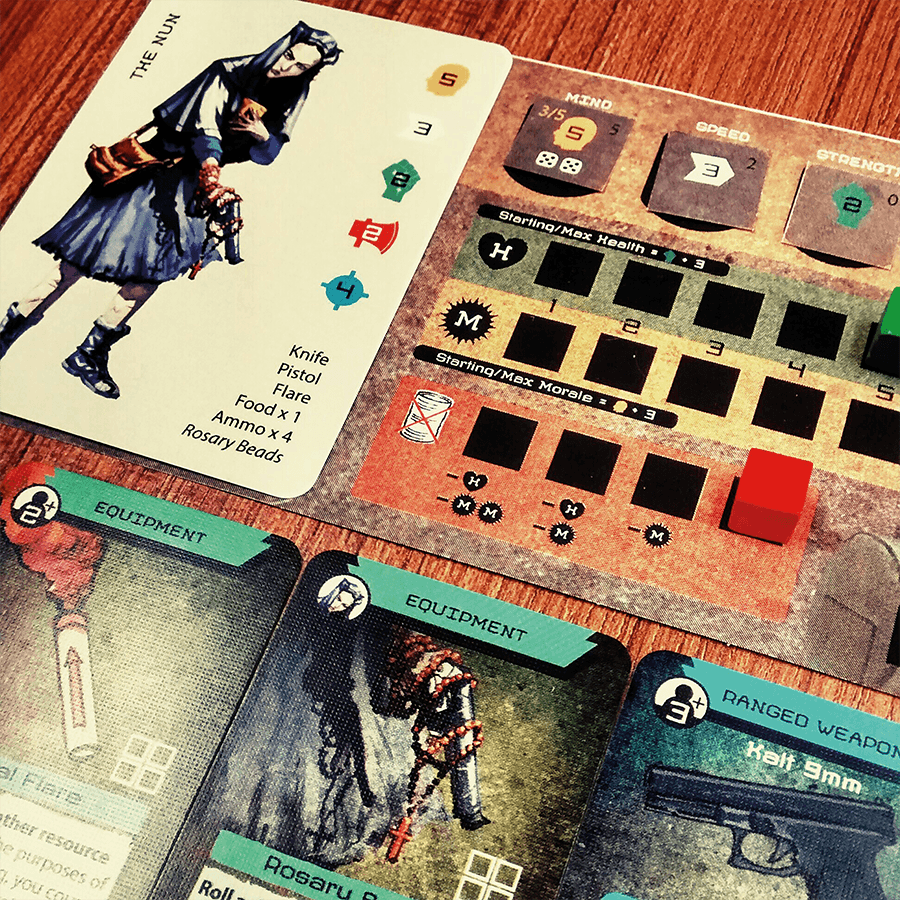



Comments are closed for this article!